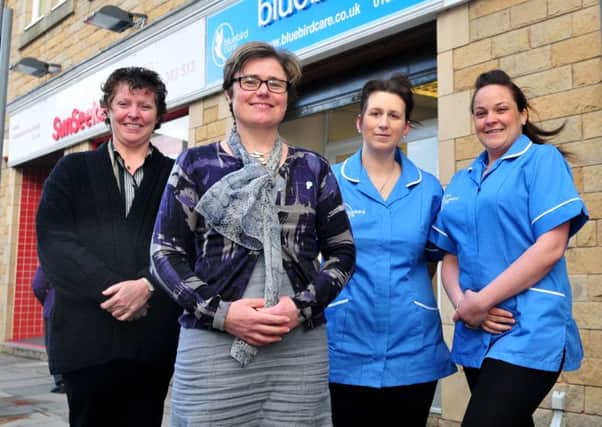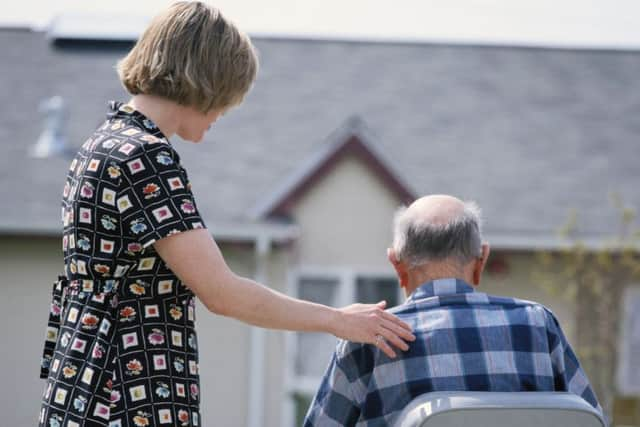Care services putting older people at risk, damning report reveals


A home care provider in Lancaster says that cutting corners, poor training, call cramming and low pay are all features of “atrocious” examples of how Lancashire cares for its elderly.
A Lancaster woman whose husband received care visits during his last days of terminal cancer said she would “rather go without”.
Advertisement
Hide AdAdvertisement
Hide AdUK Homecare Association (UKHCA), the national association for organisations who provide care to people in their own homes, published its Minimum Price for Homecare report, revealing that Lancashire County Council (LCC) pays £12.17 per hour of care.


But Claire Evans, from Bluebird Care, in Morecambe Road, says there is no way she could offer a good standard of care at the rate the county council pays.
She says that as a result of the set rate, which is also the average for the north west of England and the second lowest rate in the country, vulnerable people, and care staff, are suffering.
UKHCA says that £16.70 per hour is the minimum amount needed from April 1 to provide proper standards of care.
Advertisement
Hide AdAdvertisement
Hide AdAnother report claims that independent and voluntary sector homecare providers receiving low fees from local authorities could be forced into withdrawing from care, or going out of business.


This month, Lancaster based Heritage Homecare Services Ltd went into liquidation after failing to pay staff wages.
The company blamed LCC for not paying invoices on time, but the council said it was up to the business to manage its own cashflow.
Staff at the company raised issues of poor standards of care, and it is now being investigated by Lancashire Police.
Advertisement
Hide AdAdvertisement
Hide AdColin Angel, policy and campaigns director for UKHCA, said his organisation met with LCC in February to express concerns from local providers.
He told the Lancaster Guardian: “We urged the council to engage with their local providers so that they could understand the real cost of the care they purchase.
“The deteriorating funding for adult social care services is being felt around the country.
“The fees that councils pay for homecare have been cut in real terms, despite the increasing wage costs and the introduction of the National Living Wage this April.
Advertisement
Hide AdAdvertisement
Hide Ad“Many care providers are already considering whether they can continue to contract with local councils, and the risk of financial collapse of individual providers has become significantly higher.
“The prospect of a care provider going out of business creates considerable anxiety not only for careworkers, but for people who receive care and their families. While councils are not responsible for propping-up independent and voluntary sector providers, they do have duties to maintaining a stable local care market.”
Mrs Evans, whose company charges £16.45 per hour for home care, mostly directly via her clients, said that care companies who accept the rates have to cut corners in some way, whether through poor training, low pay and terms or through “call cramming”.
The public, she says, should not be accepting this.
She says that care companies often justify a short visit by saying the required tasks took less time.
This is known as call cramming.
Advertisement
Hide AdAdvertisement
Hide Ad“Local authorities have a safeguarding duty to vulnerable people in the community,” she said.
“They need to be sure that those companies they commission to deliver social care services will ensure the safety and well-being of those vulnerable people. “The same goes for the NHS who also commission home care services through its Continuing Healthcare Scheme.
“I’m not sure how effectively they are doing that.
“Certainly my market research before I set up Bluebird Care indicated that there is a lot of poor care in the Lancaster and Morecambe area and some atrociously poor care.
“The local authority (and sometimes the NHS) is charged with spending taxpayers money on behalf of those vulnerable people.
Advertisement
Hide AdAdvertisement
Hide Ad“You could say therefore that really the money belongs to the vulnerable people rather than to the local authority. ndeed, that is what the government is getting at with elements of last year’s Care Act. People with assessed needs should be asked by social workers whether they would like to manage their own budget allocation before the social worker makes any suggestion that the local authority will choose what care arrangements get put in place.
“In my view, if LCC doesn’t pay the service provider for the services that get provided then this is putting vulnerable people at risk and the county council is failing in its safeguarding duty.”
County Councillor Tony Martin, cabinet member for adult and community services, said:” Lancashire County Council will be paying care providers £12.75 per hour from 1 April 2016.
“This rate cannot easily be compared with those offered by other councils as it covers 50 minutes of contact time, where staff provide support to people they care for and 10 minutes of travel time. Other factors unique to each area, such as the spread of population and geography of the area also affect the rate that council’s set.
Advertisement
Hide AdAdvertisement
Hide Ad“The increase in rates from £12.17 to £12.75 takes into account specific inflation factors such as the living wage increase (as set out by the government) and pension auto enrolment, in addition to other general increases and costs using the latest inflation rates.
“The county council has paid, and continues to pay, care providers what they are owed according to contractual terms and conditions of care contracts. It always aims to settle payments as quickly as possible.
“We want to ensure that everyone receiving social care is safe and well, and has the support they need. We work closely with the CQC, NHS and other organisations to ensure that providers offer a high standard of care.”
A Lancaster woman, who did not wish to be named, said that she would “rather go without” than receive the care her husband did in his final few weeks of life.
Advertisement
Hide AdAdvertisement
Hide AdShe said: “Last year my husband was diagnosed with terminal bowel cancer, and was sent home with a care package.
“The only firm available was the one I didn’t want.
“I was not impressed with the care my husband received.
“Often they would only stay 10 minutes, and there was only one of them that washed their hands.
“The only time they could give us in the morning was 7am, when they would come to give him a bed bath and shave him.
“It was far too early but we were told that if we didn’t take this company we would have to go without.
Advertisement
Hide AdAdvertisement
Hide Ad“I just didn’t seem to know where I was with them, and they didn’t come at the time they were supposed to.
“My husband died in January, so we received care for three weeks. It was getting to the point where it was a hindrance rather than a help. I was made to feel very uncomfortable in my own home.
“To be truthful, if I was in the same situation I wouldn’t take the care. I would rather stay in hospital.
“Don’t get me wrong there were one or two that were lovely and couldn’t do enough, but it was spoiled by the others.
“Standards need to be improved.”
Advertisement
Hide AdAdvertisement
Hide AdClaire Evans from Bluebird Care in Lancaster, shares her thoughts on how better community care standards would help reduce pressure on hospitals.
She said: “Can a small care company cope financially with thousands of pounds in arrears by its debtors and the need to pay its workers on at least a monthly basis?
“I certainly couldn’t.
“Cash flow is one of the biggest challenges for many home care companies. Do they rush the client? Do they complete the tasks properly and to a high standard? Do they neglect them?
“What about the social element of social care: time spent just being with someone, alleviating their loneliness, helping them to talk about what’s worrying them thereby lessening the burden.
Advertisement
Hide AdAdvertisement
Hide Ad“If a social worker has assessed that someone needs half and hour, then that is what they should have.”
Mrs Evans also says that staff rotas can often be unrealistic, with vulnerable people bearing the brunt of it.
She added: “Better community care standards will make a significant contribution to reducing the pressure on our hospitals and acute services and will help improve the health, independence and well-being of our local community.”